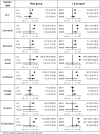Cancer risks in Lynch syndrome, Lynch-like syndrome, and familial colorectal cancer type X: a prospective cohort study
- PMID: 32448342
- PMCID: PMC7245918
- DOI: 10.1186/s12885-020-06926-x
Cancer risks in Lynch syndrome, Lynch-like syndrome, and familial colorectal cancer type X: a prospective cohort study
Abstract
Background: Individuals with pathogenic germline variants in DNA mismatch repair (MMR) genes are at increased risk of developing colorectal, endometrial and other cancers (Lynch syndrome, LS). While previous studies have extensively described cancer risks in LS, cancer risks in individuals from families without detectable MMR gene defects despite MMR deficiency (Lynch-like syndrome, LLS), and in individuals from families fulfilling the Amsterdam-II criteria without any signs of MMR deficiency (familial colorectal cancer type X, FCCX) are less well studied. The aim of this prospective study was to characterise the risk for different cancer types in LS, LLS, and FCCX, and to compare these with the cancer risks in the general population.
Methods: Data was taken from the registry of the German Consortium for Familial Intestinal Cancer, where individuals were followed up prospectively within the framework of an intensified surveillance programme at recommended annual examination intervals. A total of 1120 LS, 594 LLS, and 116 FCCX individuals were analysed. From this total sample, eight different cohorts were defined, in which age-dependent cumulative risks and standardised incidence ratios were calculated regarding the first incident occurrence of any, colorectal, stomach, small bowel, urothelial, female breast, ovarian, and endometrial cancer, separately for LS, LLS, and FCCX.
Results: The number of individuals at risk for first incident cancer ranged from 322 to 1102 in LS, 120 to 586 in LLS, and 40 to 116 in FCCX, depending on the cancer type of interest. For most cancer types, higher risks were observed in LS compared to LLS, FCCX, and the general population. Risks for any, colorectal, stomach, urothelial, and endometrial cancer were significantly higher in LLS compared to the general population. No significantly increased risks could be detected in FCCX compared to LLS patients, and the general population. Colorectal and endometrial cancer risks tended to be higher in LLS than in FCCX.
Conclusions: The characterisation of cancer risks in patients with LLS and FCCX is important to develop appropriate surveillance programmes for these specific intermediate risk groups. Larger prospective studies are needed to obtain more precise risk estimates.
Keywords: Cancer risk; Familial colorectal cancer type X; Lynch syndrome; Lynch-like syndrome; Prospective surveillance study.
Conflict of interest statement
The authors declare that they have no competing interests. Matthias Kloor is an Editorial Board Member of BMC Cancer.
Figures
References
-
- Win Aung Ko, Jenkins Mark A., Dowty James G., Antoniou Antonis C., Lee Andrew, Giles Graham G., Buchanan Daniel D., Clendenning Mark, Rosty Christophe, Ahnen Dennis J., Thibodeau Stephen N., Casey Graham, Gallinger Steven, Le Marchand Loïc, Haile Robert W., Potter John D., Zheng Yingye, Lindor Noralane M., Newcomb Polly A., Hopper John L., MacInnis Robert J. Prevalence and Penetrance of Major Genes and Polygenes for Colorectal Cancer. Cancer Epidemiology Biomarkers & Prevention. 2016;26(3):404–412. doi: 10.1158/1055-9965.EPI-16-0693. - DOI - PMC - PubMed
MeSH terms
Substances
Supplementary concepts
Grants and funding
LinkOut - more resources
Full Text Sources
Medical




